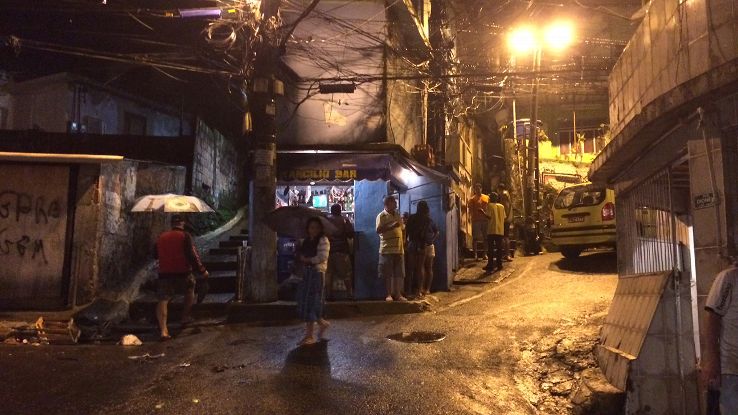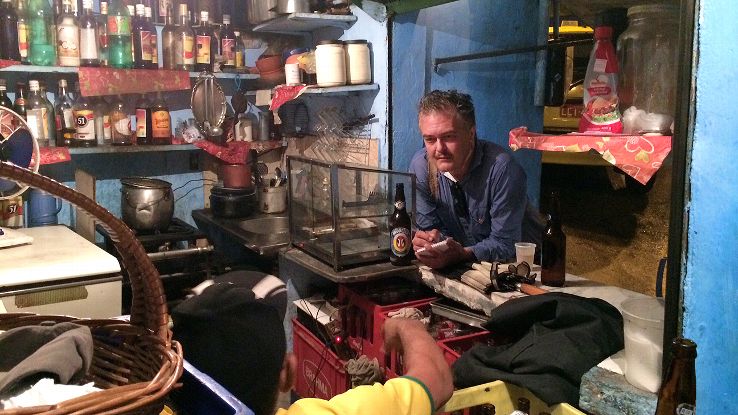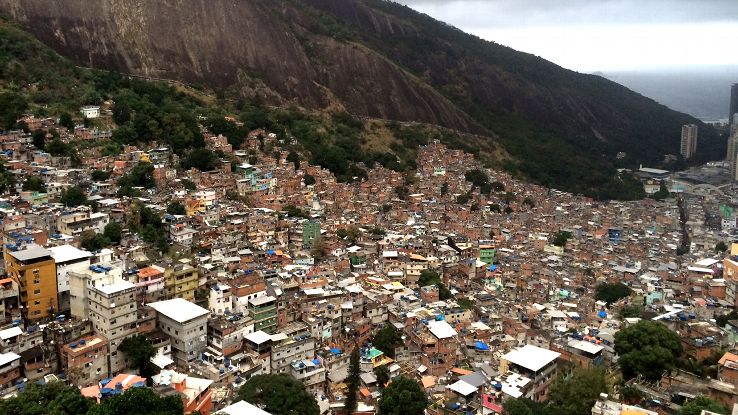
RIO DE JANEIRO -- The gods knew. A heavy winter thunderstorm in Rio de Janeiro is an unusual and portentous thing, and when the skies turned dark an hour before Tuesday's kickoff, the people in the streets of the Rocinha favela looked up and waited. Some ignored it, or told themselves lies, but the sign was there for anyone who believed in that sort of thing. Cars and motorcycles snaked up the single street winding through Rocinha, a sprawling south zone slum, and pedestrians rushed up and down the narrow staircase alleys. Somewhere in the favela, a block rocker with two blown subwoofers blared "We Are the World," and then the downpour came, hard and cold, roaring down the hill, waterlogging the streamers and flags strung over the road and the endless twisting alleys.
Fifteen feet down one of those narrow lanes, people huddled in one of the hundreds of storefront bars, watching Channel 32 -- or, rather, trying to. The screen was pixelated, like a puzzle put together incorrectly, and a loud sound like a car horn came from it, then it went black. Twenty minutes until kickoff and the television wasn't working. The water splattered off the bootleg wires running above the favela. Down the street, a single fan blew a vuvuzela three times, then gave up, the last bleat sounding like a dying animal. People stared helplessly at the screen.
"The rain," the bartender said.
The game would be over long before the storm.

On the way up the hill, I'd passed a Rocinha beer hall called Bar do Moacir, an infamous name in Brazil, one that evokes the unspoken fear of all star athletes: that they might indeed live forever, only not in the way they dreamed of as children. Wanting something as unstable as love carries risk.
Some become Pele. Others become Moacir Barbosa.
Once, people knew Barbosa as maybe the best goalkeeper in the world, a rock at the back of the Brazilian defense. His life changed on July 16, 1950, the day of the World Cup final versus Uruguay. Brazil, emerging from World War II with a hopeful, powerhouse economy, hosted the tournament. Heavy favorites, the Brazilians breezed through to the final, in the newly built Maracana Stadium, holding 200,000 fans, a bullring of noise. With about 10 minutes to go, the score tied 1-1, a Uruguayan player let a shot fly toward the goal. Barbosa expected a cross and got tangled and helplessly watched the ball hit the net.
Brazil lost.
Forty-nine years later, Barbosa died broke and broken, considered bad luck, and never allowed to even attend a national team practice. For him, the worst moment wasn't the whispers, or even walking off the field when the whistle blew. According to his melancholy obituary, he walked into a store or a bar 20 years after the goal. A woman there pointed at Barbosa, then told her son: "He is the man that made all of Brazil cry."
I visited his grave once, in a bleak cemetery an hour or so from Sao Paulo. Rows of vertical graves rose like the stacks at a library, and, instead of marble tombstones, names and dates and messages of grief were written in the quick-dry concrete. In Brazil, poor people can't afford eternity, so they put loved ones in temporary graves, and after the body decomposes, usually five years, the seal is cracked and the remains removed, cremated and returned. Barbosa is perhaps the only one with a permanent marker, because someone wrote a check to keep him from being exhumed. The day I went there, with a television crew, I tried to stay out of the way and happened upon an exhumation. With a woman, dressed like a widow, watching, a cemetery worker filled up a plastic garbage bag with remains and the decayed pieces of coffin and lugged it back down the sidewalk.
That is where Barbosa is buried, or at least his body is, because his memory is still alive, on the lips of Brazilian fans last night, after two early goals ended any hope of advancing to the first World Cup final held at Maracana since 1950. Some Brazilians had been willing to endure the event's expense and corruption in exchange for a title, and now that hope, too, was gone.
When the second goal hit the net, I headed back down the street to Bar do Moacir. Goals 3, 4 and 5 came during the short walk, and with each one, fireworks exploded in anger, or maybe irony, big M-80s echoing in the narrow streets like artillery rounds, which made dogs bark and howl, then the strangest thing: silence.
Favelas are cauldrons of noise, night and day, but in Rocinha on Tuesday night, as people realized a loss was becoming the worst day in the history of Brazilian soccer, the streets went quiet. Nobody screamed. The only sound came from televisions and from the crackle of water on pavement and the rush of water through drains. People crowded around the outdoor, storefront bars, together but alone, a thousand private hells. Bar do Moacir was closed, locked up tight, but a man at the bar next door shook his head and grumbled, "Cinco-zero."
Up an alley to the right, Marcilio Severo worked at a tiny cafe he built himself. He's 71, and, standing behind the green plywood bar, and the turquoise concrete walls, he looked out into the rain.
"I don't understand what happened," he said.
The customers watched on his small Panasonic TV. This was the worst game he has ever seen, Marcilio said, wondering whether someone paid off the Brazilian team. His anger flared for a moment when it was suggested that Neymar not playing affected the game.
"No!" he said. "The whole team isn't playing!"
Otherwise he wasn't mad, just sort of hollow, disgusted and resigned. Germany scored another goal: 6-0, then another, 7-0. The television showed Brazil keeper Julio Cesar's face, looking up at the sky for help that was not coming, not in this lifetime, and if his complicated emotional state could be rendered into a word, that word would be "Barbosa."
"Too many people suffering because of the goalkeeper," Marcilio said.
Marcilio collapsed on his wooden stool, his arm resting on a beer crate, thinking back to when he was a child. It's clear in his mind. He was 7. His family went to a local ballroom to listen to the World Cup final on the radio. Televised sports in Brazil did not yet exist. They all followed the match, writing down notes and commentary. When it ended, everyone cried, even the adults. He can still picture it, and 64 years later he keeps those notes about the game in a drawer at home, a reminder of the worst he's ever felt about the national team until tonight.
"I remember 1950," he says. "I remember going home after the game."

Nobody went home.
The end of the game arrived slowly, and in Rocinha, and in the streets below, another strange thing happened: The people standing outside around the televisions didn't move, unable to turn away. As long as they stayed out, and together, the reality of tomorrow could be held at bay.
Finally, the whistle blew and all those people began to process the 7-1 loss in their own ways.
A fan of the local club Flamengo walked up to Marcilio's bar and announced that he'd sold his Fred and Neymar jerseys, and he tugged at his red and black Flamengo shirt, and said: "On Wednesday, my team starts playing again. This team gives me joy and happiness all year."
The mood in the alleys started to turn, with locals accusing me and my translator of being cops, grabbing my notebook. Some young punks poured cheap wine and smoked a cigarette to the nub, using it to light another. "We are full of hate!" one of them named Pedro said. "We are gonna go down to Leblon and break everything!"
We got on a city bus and headed back to the asphalt neighborhoods below. At every stop, the sound of the broadcast flooded the silent bus. People shrugged when we made eye contact. On our bus, a young woman said: "I was in Copacabana and people were getting violent, so I came back."
On the beach, a fight broke out.
Someone fired a gun.
A group of German fans, one wearing a jersey and the other two with scarves, got on the subway and 50 or 60 favela kids surrounded them, the main pack of a dozen aggressors standing around them, flexing, looking for a fight. Some Brazilian girls with the Germans defused the looming confrontation, and by the end the kids wanted to pose for pictures with the victorious fans.
"We just made it out," Peter Mesenich said. "At 7-1, they turned on their team. At 2-1, they would have turned on us."
In the hippie bars of Santa Teresa, drunks tried to intellectualize the defeat. A man named Carlos Eduardo Barata, 56, drank his cold bottle of Antarctica Original and said that more than a game had been lost.
"We have to stop," he said. "Brazil isn't the best and hasn't been for many years. We have to see what is ahead in the future."
He looked around the bar and saw resignation.
"Everybody knows," he said.
Barata argued that perhaps the defeat was good because it would make Brazil return to its attacking, samba style of football and let go of its fascination with everything European. A friend called him a liar, and they laughed, and headed out into the night.
The night ended in a whimper. Outside of a few incidents, nobody rioted or howled at the moon. Rio de Janeiro became a collection of tiny personal portraits of defeat. A man wrapped in a Brazilian flag stood, visibly sagging, at the KFC counter. Someone in Santa Teresa smoked a joint in the rain. At the all-night Copacabana sandwich shop, a row of dejected customers ate in silence and drank one last beer. The television there was tuned to a soap opera, the first time I've ever seen it not playing a soccer match or highlights from a soccer match. The Lagoa neighborhood flooded, and the taxis left wakes, cutting through the standing water, hoping not to stall. "Tonight reminds me of the Day of the Dead," said Claudio Aragao, one of those cabdrivers.
Somewhere in a hotel room, the rest of Julio Cesar's life began, and in Rio the hangover settled down on the empty streets and beaches. Copacabana didn't look like the place that's been hosting a monthlong party bursting with debauchery. More games remained, but the World Cup was over. No music played. Locals shuffled home along the mosaic sidewalk.
As midnight approached, a single fan stumbled across the sand.
He wore orange.
No comments:
Post a Comment